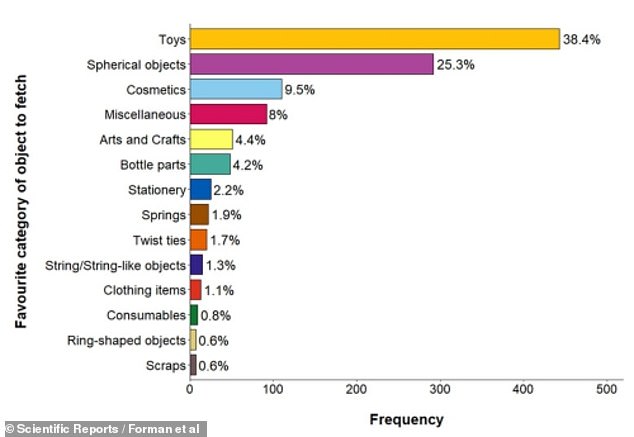Feline playful! Cats like to play fetch just like dogs, study finds
- Scientists believe that retrieving behavior in cats is instinctive
- It can help strengthen the bond between the pet and its owner
Fetching is a big favorite of dogs, but surprisingly, cats enjoy it too.
However, cats can 'manipulate' their loving owners by refusing to play fetch unless they decide to do so, often in the middle of the night.
In many cases they will only retrieve a specific object of a very precise size.
And cats seem reluctant to bring an object all the way back to their owner – sometimes dropping it further and further away so that the owner actually has to 'get' it for them.
The findings come from a survey of 924 cat owners who reported having cats that play fetch.
It's not just dogs that like to play fetch – some cats do it too, scientists have discovered (stock image)
In 94 percent of cases, researchers found that cats were not trained to retrieve objects, but came up with the idea themselves.
The behavior was most commonly observed in purebred pets, namely Siamese, Bengal and Ragdoll cats, although most retrieving cats were mixed breeds.
Dr. Elizabeth Renner, co-author of the study from the University of Northumbria, said: 'Cats seem to make retrieving more interesting for themselves, often only playing when they feel like it.
“They normally only fetch a little less than five times, and the pickier cats only fetch certain items.”
Fetching may seem like the ultimate test of pet obedience, as they obligingly retrieve an object and drop it at their owner's feet.
But dogs that initiate a game of fetch, rather than doing it when their owner wants them to, have been shown to behave more dominantly and are more likely to demand attention and food.
Cats, who are no strangers to making demands on their owners, also seem to enjoy initiating games of fetch.
Nearly half of the 1,154 cats described by owners in the study played fetch when the game was their idea.

The cats showed individual preferences for the objects and members of a household they liked to play with
And cats were on average more willing to return an object if the fetch game was initiated by them.
Unlike dogs, cats were generally unable to return an object all the way to its owner.
Examples given by researchers included “dropping the object halfway between where it landed and where it was first thrown” or “gradually dropping the object further and further away from the owner.”
Some cats only played fetch in specific locations, the study found, with the stairs being popular, as well as the bedroom – where cats could drop a toy on the bed while their owner slept to try to wake them up and start a play session. .
Some cats only played fetch with specific people they lived with, or with specific toys.
One cat owner told researchers: 'The size of the pom-pom is important. I bought a larger pom pom and she rejected it.
“I've also tried small items that are about the same size as the pom pom, but she rejects that too.”
Nearly 61 percent of cats started playing fetch as kittens, while 36 percent were young adults.
Specialty cat toys made up less than 40 percent of the items cats retrieved, with pets often opportunistically grabbing other items such as crumpled paper, hair ties and bottle caps.
The study was published in the journal Scientific Reports.
Jemma Forman, who led the research at the University of Sussex, said: 'Not all cats will want to play fetch, but if they do, it's likely they will have their own specific way of doing it.'

